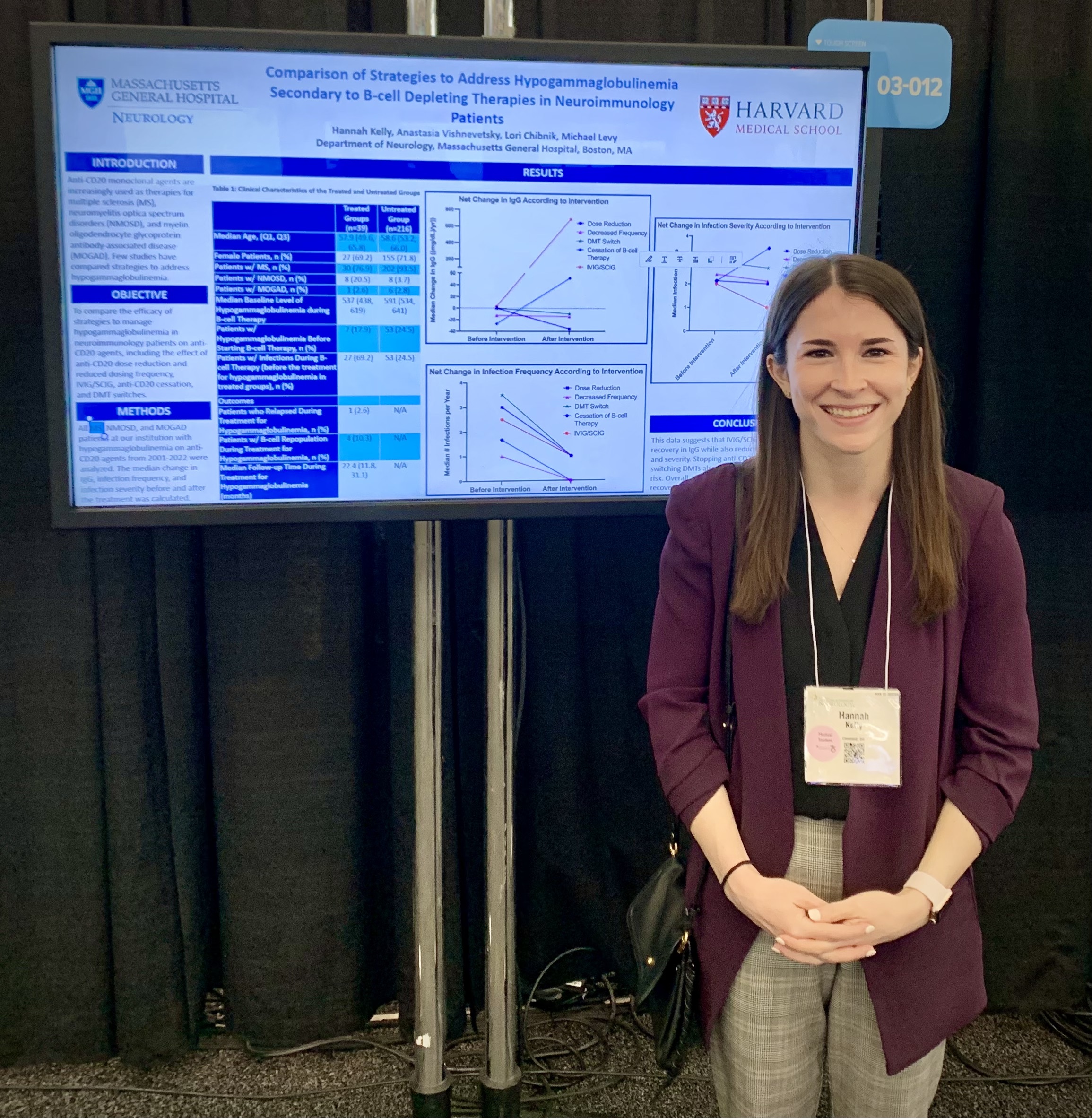Passion to Path: A Career in Neuroimmunology by Hannah Kelly
My name is Hannah Kelly, and I’m a fourth-year medical student at Case Western Reserve University School of Medicine and an aspiring neuroimmunology specialist. I want to share my path toward neuroimmunology and why I hope to treat patients with rare neuroimmune diseases.
My first introduction to neuroimmunology began in my gap year after college, where I spent a year at the NIH in Dr. Daniel Reich’s lab. There, I studied new MRI techniques to better understand demyelination in multiple sclerosis (MS), and I also shadowed neuroimmunology specialists treating clinical trial patients. The interplay between the central nervous and immune systems fascinated me, and I explored this interest upon entering medical school.
In the beginning of my first year of medical school, I was lucky to meet Dr. Hesham Abboud, a neuroimmunology and movement disorders specialist who became my close mentor and role model. With Dr. Abboud, I published a review on the safety and efficacy of COVID-19 vaccines in MS. We also published a study on central nervous system inflammation including MS, Neuromyelitis Optica Spectrum Disorder (NMOSD), MOG Antibody Disease (MOGAD), Autoimmune Encephalitis, Transverse Myelitis (TM), Optic Neuritis (ON), secondary to vaccines and various biologic therapies.
Interviewing and examining patients in Dr. Abboud’s neuroimmunology clinic solidified my desire to pursue neuroimmunology. I remember hearing about MOGAD for the first time when listening to a virtual visit with Dr. Abboud. Learning that a newly-discovered antibody could distinguish a subset of patients as having a disease separate from multiple sclerosis intrigued me. And hearing Dr. Abboud discuss ongoing research and clinical experience when informing MOGAD patients about their risk of relapse also excited me. I felt energized by this evolving field with incredible potential for developing highly-targeted immunotherapies that improve patients’ quality of life.
The array of autoantibodies in neuroimmunology also captures my interest. The fact that an antibody can mistakenly target one specific protein and subsequently cause a cascade of unique neurologic symptoms and imaging findings fascinates me. And in my opinion, this plays out in the most interesting way in autoimmune encephalitis. During my neurology rotation in my 3rd year of medical school, I encountered a patient with anti-GFAP autoimmune encephalitis. Because the autoimmune encephalitis antibody tests take weeks to result, our team relied on a high level of clinical suspicion to empirically treat the patient with an array of immunotherapies–steroids, PLEX, and rituximab. We also turned to case reports published on anti-GFAP autoimmune encephalitis to fine-tune our treatment approach when our patient did not improve as much as we hoped. Watching an initially comatose and paralyzed patient gradually regain significant function–both physically and mentally–with an evolving treatment approach was amazing.
Later in medical school, Dr. Abboud introduced me to his colleague Dr. Michael Levy, who I was fortunate to work with for two months at Massachusetts General Hospital. We conducted a study on the impact of strategies to address hypogammaglobulinemia in neuroimmunology patients on B-cell-depleting therapies—stay tuned for a future publication! Attending Dr. Levy’s weekly neuroimmunology clinic was the highlight of my experience in Boston. Witnessing the trust patients of all ages and from all over the country (and even other countries) had for Dr. Levy and his expertise on their diseases was incredible. I hope to similarly become an expert in rare neuroimmune diseases and a trusted advocate for these patients.
Presenting my work with Dr. Levy at the 2023 AAN Annual Meeting in Boston
Overall, I am drawn to neuroimmunology because of the significant potential for clinical recovery with various immune therapies and the complexity of treating patients, often without a final diagnosis or clear guidance from evidence published in clinical trials.
Thank you for reading my story, and I look forward to the privilege of caring for patients with rare neuroimmune diseases in the future.
Our “In Their Own Words” blog posts represent the views of the author of the blog post and do not necessarily represent the views of SRNA.





